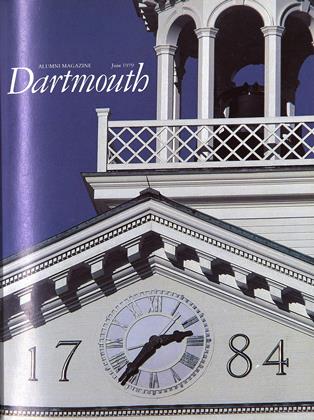The end of winter term was made portentous by the March 8 forum on racism and sexism known as Moratorium Day. No one knew what would follow the public presentation of grievances and demands made that morning by representatives of the College's Native American, black, female, and Latino organizations.
When spring arrived, however, the students' fancies seemed to turn to celebration. The Native American Arts Festival and pow-wow brought drummers and dancers, movies and speakers to Hanover for a week of celebration capped off by a big Storrs Pond picnic. The Latino Forum presented a movie on Mexico, imported a band from New York City, and threw a big barbecue for everybody as part of its first annual Latino Festival. Alpha Phi Alpha, the College's all-black fraternity, gave a Black and Gold Ball in tribute to black women at Dartmouth. And the seven or eight local women's groups came together at the Collis Center for discussion and music in a Celebration of Women, held to mark the appointment of the College's first woman Trustee and the Trustees' decision to do away with the admissions quota on women.
That decision, as Associate Dean of the College Alvin Richard put it, has been the biggest plus" to transpire since Moratorium Day. Richard termed the new single pool" admissions policy "the most positive step we have taken as an institution, " explaining that "the malefemale ratio cuts across many, many lines and many, many problems."
Other recent minority gains at Dartmouth include tenure appointments for a black professor and a Native American professor and a faculty decision to award permanent status to the College's Black Studies program. Richard also found encouraging the fact that President Kemeny took time to meet with concerned black students during the hectic days immediately following his appointment as head of the Three Mile Island commission. (Women students, according to Moratorium Day speaker Judith Aronson '82, tried with less success to make an appointment with the president during that busy time.) The Rugby Club announced its decision to remove the Indian symbol from its jerseys, and faculty returning from the first annual convention of the National Women's Studies Association, held in Kansas, reported that Dartmouth leads among the five previously all-male Ivy League colleges in support of women's studies programs. Professor of Chemistry Paul Shafer, who chairs the faculty's Committee on Admissions and Financial Aid, said also that Moratorium Day may well have sparked "a greater sense of urgency" on the part of his committee as it looks into "the whole matter of minority admissions and minority financial aid, including the possibility of increased representation of Latinos in the entering classes."
Despite the gains and the celebrations, students are continuing to organize themselves around the issues of sexual and racial equality at Dartmouth. Black students, according to Richard, plan to request a meeting with the dean of the faculty to discuss curricular changes they see as essential to the due recognition of black contributions to culture and society. The Dartmouth Women's Alliance (formerly Women at Dartmouth) has organized itself into student task forces to work toward solving the various problems of women articulated during Moratorium Day - day-care, athletic programs, and a rape crisis center, among others. Far from disbanding, Concerned Students for Equal Access has dedicated itself to monitoring the all-important implementation of the new admissions policy. And Dean of the College Ralph Manuel reports that Native American students are already busy helping to organize next year's big Native American educational conference at Dart- mouth.
All in all, the winter of our discontent seems to have occasioned a beneficial lancing of some festering sores. As Dean Richard said, "You cannot effectively deal with problems until they surface. Ours were, to some degree at least, covert - and suddenly Moratorium Day got them out front, where we could begin actively to deal with them. It was a good thing."
 View Full Issue
View Full Issue
More From This Issue
-
 Feature
Feature'We will all make whoopee'
June 1979 By Dick Holbrook -
 Feature
FeatureE – i – e – i – o
June 1979 By Marshall Ledger -
 Feature
FeatureExit with a Flourish
June 1979 By Beverly Foster -
 Feature
FeatureEncouraging growth, affirming the educational process
June 1979 By Robert Kilmarx -
 Article
ArticleCommencement
June 1979 By James L. Farley -
 Article
Article'Radical' with a Cause
June 1979 By Tim Taylor
Article
-
 Article
ArticlePRESIDENT TUCKER'S RESPONSE, ACCEPTING THE NEW DARTMOUTH HALL IN BEHALF OF THE TRUSTEES
AUGUST 1906 -
 Article
ArticleLAMBS SUCCESSFULLY STAGE THREE ONE ACT PLAYS
August, 1923 -
 Article
ArticleThayer School
April 1941 -
 Article
ArticleInn goes dry
SEPTEMBER 1987 -
 Article
ArticleLoving the Dartmouth Life: A View from a '90
OCTOBER • 1987 -
 Article
ArticleThayer Report
January 1946 By F. H. Munkelt '08 (Thayer School '09)


